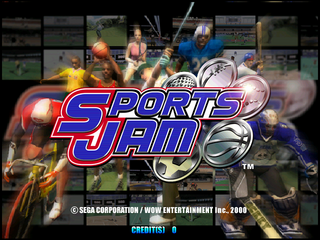Difference between revisions of "Sports Jam"
From Sega Retro
m (Text replacement - "{{galleryPrintAd\|.*\.pdf\|" to "{{galleryPrintAd|") |
(→Production credits: Fixed a typo originating from misreading H as N.) |
||
| Line 33: | Line 33: | ||
*'''Design Section:''' [[Taku Makino]], [[Toshihiro Ando]] | *'''Design Section:''' [[Taku Makino]], [[Toshihiro Ando]] | ||
*'''Soft Section:''' [[Akira Wada]], [[Motoyoshi Sato]], [[Hiroshi Ando]] | *'''Soft Section:''' [[Akira Wada]], [[Motoyoshi Sato]], [[Hiroshi Ando]] | ||
| − | *'''Network:''' [[Tatsuya Watanabe]], | + | *'''Network:''' [[Tatsuya Watanabe]], Hiromi Tanaka |
*'''Sound Section:''' [[Nanae Kenda]], [[Susumu Tsukagoshi]] | *'''Sound Section:''' [[Nanae Kenda]], [[Susumu Tsukagoshi]] | ||
*'''Publicity Section:''' [[Mizuki Marui]], Noriko Yamada, Takuya Tsunomura | *'''Publicity Section:''' [[Mizuki Marui]], Noriko Yamada, Takuya Tsunomura | ||
Revision as of 14:15, 6 October 2020
| Sports Jam | |||||||||||||||||||
|---|---|---|---|---|---|---|---|---|---|---|---|---|---|---|---|---|---|---|---|
| System(s): Sega NAOMI GD-ROM, Sega Dreamcast | |||||||||||||||||||
| Publisher: Sega (JP) Agetec (US) | |||||||||||||||||||
| Developer: WOW Entertainment | |||||||||||||||||||
| Peripherals supported: Dreamcast Arcade Stick, Jump Pack, Dreamcast Modem, Visual Memory Unit, Dreamcast VGA Box | |||||||||||||||||||
| Genre: Sports[1] | |||||||||||||||||||
| Number of players: 1-2 | |||||||||||||||||||
|
This short article is in need of work. You can help Sega Retro by adding to it.
Sports Jam (スポーツ・ジャム) is a Sega Dreamcast and Sega NAOMI release containing a number of sports games.
Contents
Production credits
- Executive Producer: Rikiya Nakagawa
- Producer: Kenichi Imaeda
- Director: Yasutake Nakayama
- Design Section: Taku Makino, Toshihiro Ando
- Soft Section: Akira Wada, Motoyoshi Sato, Hiroshi Ando
- Network: Tatsuya Watanabe, Hiromi Tanaka
- Sound Section: Nanae Kenda, Susumu Tsukagoshi
- Publicity Section: Mizuki Marui, Noriko Yamada, Takuya Tsunomura
- Manual And Package Design: Toshihiro Ando, Osamu Nakazato (Sega), Naohico Iida (Sega)
- Design Section: Taku Makino, Akira Miyanishi, Satoshi Nakajima, Toshihiro Ando, Shien Kato, Yasuhito Kuroiwa, Ryodo Tanaka, Toshihiro Fujimaki
- Soft Section: Hiroshi Ando, Akira Wada, Gen Miyazaki, Motoyoshi Sato
- Sound Section: Nanae Kenda
- Cabinet Design: Hiroyuki Naitoh (Sega)
- Special Thanks: Kaori Fukano, Sega Thunderbolt, Shinjuku Sports Land, All Players of Sports Jam, Swatch, adidas
- Created by: WOW Entertainment
- Presented by: Sega
- ©Wow Entertainment/Sega 2000,2001
Magazine articles
- Main article: Sports Jam/Magazine articles.
Promotional material
Physical scans
NAOMI version
Dreamcast version
| Sega Retro Average | ||||||||||||||||||||||||||||||||||||||||||||||||||||||||||||||||
|---|---|---|---|---|---|---|---|---|---|---|---|---|---|---|---|---|---|---|---|---|---|---|---|---|---|---|---|---|---|---|---|---|---|---|---|---|---|---|---|---|---|---|---|---|---|---|---|---|---|---|---|---|---|---|---|---|---|---|---|---|---|---|---|---|
|
| 73 | |
|---|---|
| Based on 12 reviews | |
Technical information
The announcer's character model consists of 18,357 polygons, including 17,183 polygons for the body[14] and 1174 polygons for the shadow.[15] This was the highest character polygon count in any video game at the time, surpassing the character polygon counts of Shenmue (up to 14,361 polygons), up until it was surpassed the following year by Virtua Fighter 4 (on the Sega NAOMI 2 arcade system) which had about 20,000 polygons per character.[16] Sports Jam also had the highest character polygon count of any consoles game at the time (the highest on any other console was up to 15,000 polygons in Dead or Alive 3 and Dead or Alive Ultimate on the Xbox) up until the release of the Xbox 360 in 2005.[17]
Technical information
ROM dump status
| System | Hash | Size | Build Date | Source | Comments |
|---|
External links
- Sega of Japan catalogue pages (Japanese): Dreamcast
References
- ↑ 1.0 1.1 1.2 http://sega.jp/dc/db/010411.html (Wayback Machine: 2004-12-06 04:28)
- ↑ 2.0 2.1 Edge, "August 2001" (UK; 2001-07-13), page 100
- ↑ 3.0 3.1 Dorimaga, "2002-18 (2002-10-11)" (JP; 2002-09-27), page 34
- ↑ 576 Konzol, "Május 2001" (HU; 2001-xx-xx), page 43
- ↑ Ação Games, "Setembro 2001" (BR; 2001-xx-xx), page 46
- ↑ Consoles +, "Juin 2001" (FR; 2001-0x-xx), page 90
- ↑ Dreamcast Magazine, "No. 24" (UK; 2001-07-12), page 60
- ↑ Dreamzone, "Mai 2001" (FR; 2001-0x-xx), page 44
- ↑ Electronic Gaming Monthly, "August 2001" (US; 2001-07-03), page 111
- ↑ Famitsu, "2001-04-20" (JP; 2001-04-06), page 32
- ↑ Game Informer, "August 2001" (US; 2001-0x-xx), page 106
- ↑ MAN!AC, "06/2001" (DE; 2001-05-02), page 50
- ↑ PSX Extreme, "09/2001" (PL; 2001-0x-xx), page 57
- ↑ File:SportsJam announcer model.png
- ↑ File:SportsJam announcer model with shadow.png
- ↑ http://game.watch.impress.co.jp/docs/20061025/3dvf5.htm (Wayback Machine: 2008-12-08 05:05)
- ↑ https://forum.beyond3d.com/threads/yes-but-how-many-polygons-an-artist-blog-entry-with-interesting-numbers.39321/ (Wayback Machine: 2015-01-08 01:39)
- Dreamcast Arcade Stick-compatible games
- Jump Pack-compatible games
- Dreamcast Modem-compatible games
- Dreamcast VGA Box-compatible games
- Visual Memory Unit-compatible games
- 1-2 player games
- All arcade games
- NAOMI GD-ROM games
- 2000 NAOMI GD-ROM games
- All 2000 games
- JP Dreamcast games
- All JP games
- US Dreamcast games
- All US games
- Dreamcast games
- 2001 Dreamcast games
- All 2001 games
- Dreamcast sports games
- All sports games
- All games
- Stubs
- Credits without reference
- Old-style rating (consolesplus)
- Rating without PDF source
- Old-style rating (edge)
- Old-style rating (famitsu)
- Old-style rating (dmjp r)
- Update ratings template
- 4 old ratings
- No ROM dumps
- Missing ROM dumps
- Old technical information








